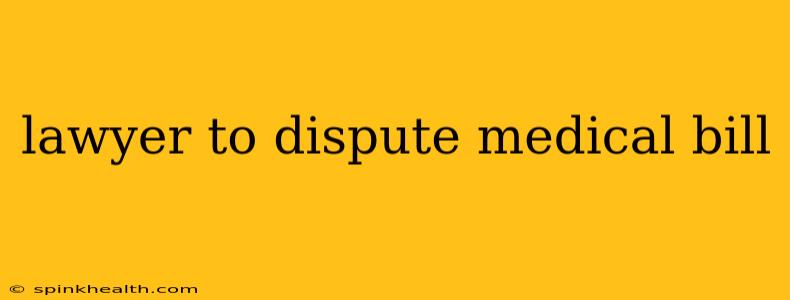The crisp white envelope landed on my kitchen counter, a stark contrast to the overflowing fruit bowl beside it. Inside, a medical bill. A hefty one. My heart sank. I’d been through a rough patch health-wise, and the bills were piling up faster than I could pay them. But this one…this one felt wrong. It was for a procedure I didn’t even have, a medication I never received. My initial panic quickly gave way to a simmering determination: I needed help, and I needed it fast. That's when I realized the power of a lawyer to dispute a medical bill.
This isn't just a story about one person's struggle with a medical bill; it's a guide for anyone facing a similar situation. Medical billing errors are alarmingly common. This article explores how a lawyer can be your lifeline in navigating this complex system and getting the fair treatment you deserve.
Why You Might Need a Lawyer to Dispute a Medical Bill
Many people initially try to resolve billing disputes themselves, often through endless phone calls and emails. But sometimes, a more assertive approach is necessary. You might need a lawyer if:
- The bill is inaccurate: This includes charges for services not rendered, incorrect coding, or duplicate billing. My own experience highlighted this painful reality.
- You're facing aggressive collection tactics: Debt collectors can be relentless, and a lawyer can protect your rights and prevent unlawful collection practices.
- You have a complex insurance situation: Navigating insurance policies, out-of-network charges, and appeals processes can be incredibly daunting.
- You suspect medical fraud: In some cases, a larger issue of medical fraud might be at play, necessitating legal action.
- You’re overwhelmed and need professional assistance: The process of disputing medical bills can be stressful and time-consuming. A lawyer can handle the paperwork, communication, and negotiations, freeing you to focus on your health and recovery.
What Does a Lawyer Do When Disputing a Medical Bill?
A lawyer specializing in medical billing disputes acts as your advocate, fighting for your rights and ensuring a fair resolution. They’ll:
- Investigate the bill: They meticulously examine the bill for errors, inconsistencies, and discrepancies.
- Gather supporting documentation: This includes medical records, insurance policies, and any communication you've had with the provider or billing company.
- Negotiate with the provider or insurance company: They'll leverage their expertise and knowledge of healthcare law to negotiate a lower amount or have incorrect charges removed.
- File appeals and pursue legal action if necessary: If negotiation fails, they'll explore other legal options to resolve the dispute.
- Represent you in court (if needed): In some cases, a lawsuit might be required to protect your rights.
How to Find the Right Lawyer
Choosing the right lawyer is crucial. You should look for an attorney specializing in healthcare law or medical billing disputes.
- Ask for referrals: Talk to friends, family, or your doctor for recommendations.
- Check online reviews: Look for lawyers with positive feedback and experience handling similar cases.
- Consult the State Bar Association: This can provide resources and verify the lawyer's credentials and disciplinary record.
- Schedule consultations: Most lawyers offer free initial consultations, allowing you to discuss your situation and assess their expertise.
Can I Negotiate a Medical Bill Myself?
Yes, you can attempt to negotiate a medical bill on your own. However, this requires significant time, effort, and a strong understanding of medical billing practices and insurance policies – something a lawyer expertly handles.
What if My Insurance Company Won't Cover the Bill?
If your insurance company denies coverage, a lawyer can help you file an appeal or take other legal action to secure the necessary coverage. They understand the appeals process and know how to present a compelling case.
What are the Potential Costs of Hiring a Lawyer?
The cost of hiring a lawyer varies depending on the lawyer's fees, the complexity of the case, and the time involved. Many lawyers work on a contingency basis, meaning they only get paid if they win your case. Others may charge hourly rates or flat fees. It's crucial to discuss the fees upfront before engaging their services.
My own journey taught me the immense value of legal assistance in navigating the complexities of medical billing. While initially daunting, the support I received from a lawyer provided peace of mind and ultimately led to a fair resolution. Don't face this battle alone. If you're struggling with an inaccurate or unfair medical bill, seek the help of a qualified lawyer. It might be the best investment you ever make in protecting your financial well-being.

